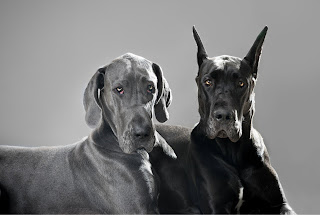Dog blog 14 - being nice

Being nice
Some moral philosophers talk about words having "thick" and "thin" moral meanings.
Bernard Williams (guest starring in Dog blog 6 - multi-dimensional morality) used to talk about that sort of thing.
The thin (and thick) of it
Thin words are words like "good", "right" or "ought" .
They can very slippery. Like one of the Dog's squeaky toys (see Dog blog 10 - plugging in) if the Dog left it outside in the rain. And maybe on the grass too - very slippery indeed.
Not a lot sticks to a toy like that, and different Dogs can mean different things when they get one of those in their mouths.
Ought
Take "ought" for example. That can mean a lot of different things. Here's an interesting talk by Judith Thomson on some of them:
Judith also talks about toasters. And, importantly, Dogs get a mention too.
Thick words
Thick words are much much stickier. Just like my old blue rubber ball that I've been chewing on and off since I was a pup: grass, dirt, slobber - they all stick to it. And it's a bit smelly.
Thick works might be "betrayal", "brutality" and "cowardice". These are some of Bernard's examples in my yellow Philosophy book (see the Dog's faves on the right). Like my blue rubber ball, a lot of meaning sticks to these, even if a different Dog has the ball in his mouth.
Telling it like it is
These thicker moral chew toys tell you a bit more about what's going on without you always having to get other chew toys in to understand them. Thin toys need other toys around (and usually a few thick ones) for Dogs to understand what each thin toy is supposed to mean, or do.
Take "right" or "good" for example. As in "it's right (or good) to help old ladies carry their shopping".
"Right" is hanging a bit on its own there: it needs other ideas to help explain it. And it gives very little away on what psychological factors might be kicking around to motivate you to help an old lady with her shopping.
Why be nice?
An interesting thing to think about thicker moral words is how much motivation they have built in for doing the thing they're referring to.
Which got me to wondering about the moral use of "nice". As in "that was a nice thing to do". Or "be nice to Dave and don't bite his ears" (Dave features in Dog blog 10 - blue mice). Or "it's nice to help old ladies carry their shopping".
I think there's moral content (or "value") in "nice" when used like that.
And I think it's a bit thicker and more sticky a chew toy than "good" is: "being nice" to others has more psychological content. "Being nice" to people is usually done to make others feel better, feel valued, or just a bit cheerier. Like me bringing Dave a slice of cake if he's feeling a bit down. You might think of that as "being nice". It might make you (or, in this case, me) feel nice too.
In the (cake) mix
Importantly, I think "being nice" has psychological content necessarily mixed up in its action; which "being good" need not.
I need to make Dave cheerier, to have had some postive feeling created at least, to have succeded in being nice to him: if the cake effort had been a disaster, and made Dave worse (and a bit grumpy), I might have met his reaction with a (slightly hurt) excuse, "I was only trying to be nice!".
I think "being nice" also hints at some of my psychological drivers for being nice; why I might have brought the slice of cake. For example, out of my concern for him.
Being nice - and not getting carried away
"Being nice" helps with the softer relations between folk. The low-level, day to day stuff: being pleasant; a smile; a bit of thoughtfulness; showing bit of concern; a small act of generosity or helpfulness. I think these are all examples of being "nice", and quite a lot of folk probably agree about that.
Now the concept of being "nice" cannot of course on its own provide the basis for a theory of distributive justice or morality: that's for other chew toys.
But "nice" serves as a useful check to getting too fancy and clever too quickly about thin words like "right" and "good". You need quite a few other chew toys around before they can start to make sense. And, to be fair, you'll need a few smooth ones too to help group the sticky ones - otherwise they'll all just get stuck together.
Right - rabbit chasing now. Which is nice for me. I might even be nice to the rabbits and let them get away... .



Comments
Post a Comment